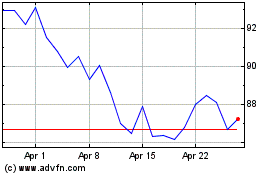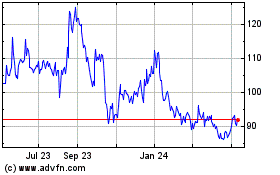Scammers Are Setting Up Fake Covid Vaccine Websites
February 26 2021 - 4:47PM
Dow Jones News
By WSJ Noted.
Scammers are taking advantage of widespread anxiety about
Covid-19, and are enticing people to give up their personal data
and money with the promise of a vaccine. Here's what you should
know about the sham sites purporting to sell doses of a Covid-19
vaccine.
KEY TAKEAWAYS
1. The scammers create websites that appear to sell doses of a
vaccine in exchange for personal information and money.
A recent sham website offered doses of Moderna's Covid-19
vaccine for $30 each and claimed "You may be able to buy a Covid-19
vaccine ahead of time." After a U.S. Department of Homeland
Security investigation of the site, three Baltimore-area men were
arrested on Feb. 11, and charged with conspiracy to commit wire
fraud. But this site was not the only scam. Fake sites posing as
Pfizer Inc. and BioNTech SE -- which offer another vaccine approved
for emergency use in the U.S. -- have also popped up. Homeland
Security investigators had seized roughly $33 million in illicit
proceeds and analyzed almost 80,000 Covid-19 domain names as of
last week, according to a spokeswoman for the agency. "Patients
should never try to secure a vaccine online -- no legitimate
vaccine is sold online," said Pamela Eisele, communications
director for Pfizer.
2. Many of the impostor websites offer payment methods such as
Zelle and Square.
Many Covid-19 scam attempts involve simple tools and everyday
payment methods, says Pat Wilbur, chief technology officer at
Hologram Inc., a Chicago-based cellular platform company. Although
some pandemic scams might seem obvious to some, they often work
because people are desperate to get back to normal, said Wilbur,
who said he reports scammers to authorities as a hobby. Early
Warning Services LLC, which operates Zelle, said the company
monitors its network for transactions that violate its terms of
service. Consumers are advised to treat Zelle payments like cash
and be aware of "too good to be true" offers, the company said. A
representative for Square said, "We continue to invest in and
bolster fraud-fighting resources by both increasing staffing and
adopting new technology."
3. Scammers take advantage of online search patterns.
As life moves increasingly online, experts say consumers are
more vulnerable to these kinds of tricks. Scammers use search
algorithms and paid advertisements to take advantage of their
trust, said Douglas Schmidt, co-director of the Data Science
Institute at Vanderbilt University. Older populations who weren't
raised on the internet are especially vulnerable, he said. "You
expect that Google will only give you stuff that's valid," he
said.
4. Scammers have also mimicked companies that manufacture drugs
to treat Covid-19.
The Maryland U.S. attorney's office shut down two similar though
unrelated schemes in December that mimicked drug companies. The
sites aimed to collect personal information for phishing attacks.
One used the web address regeneronmedicals.com, and claimed to be
linked to Regeneron Pharmaceutics Inc., the biotechnology company
that provided the treatment used on former President Trump late
last year when he had Covid-19. Another, at mordernatx.com, had the
look of the Cambridge, Mass.-based biotech's actual website,
modernatx.com. A representative for Regeneron Pharmaceuticals Inc.
said the company is aware of the impostor website and appreciates
the work done by investigators on the matter. Moderna didn't
respond to requests for comment.
Read the original article by Brooke Henderson here.
(END) Dow Jones Newswires
February 26, 2021 16:32 ET (21:32 GMT)
Copyright (c) 2021 Dow Jones & Company, Inc.
BioNTech (NASDAQ:BNTX)
Historical Stock Chart
From Mar 2024 to Apr 2024

BioNTech (NASDAQ:BNTX)
Historical Stock Chart
From Apr 2023 to Apr 2024
